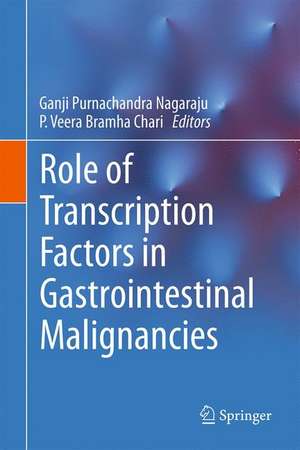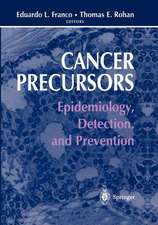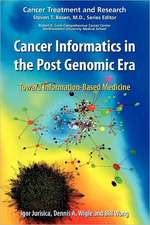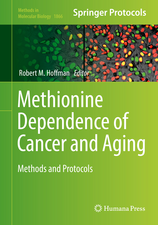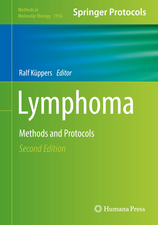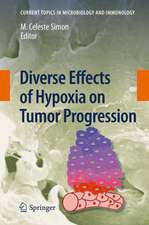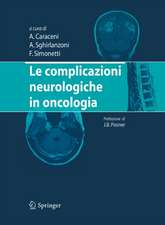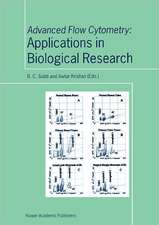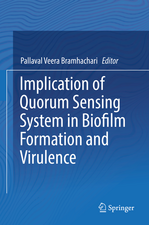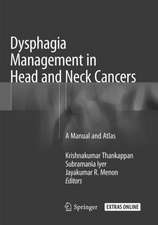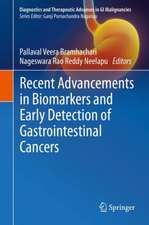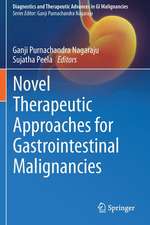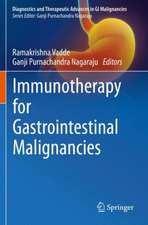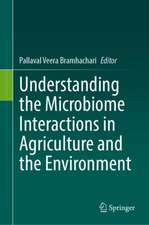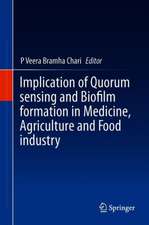Role of Transcription Factors in Gastrointestinal Malignancies
Editat de Ganji Purnachandra Nagaraju, Pallaval Veera Bramhacharien Limba Engleză Hardback – 10 apr 2018
| Toate formatele și edițiile | Preț | Express |
|---|---|---|
| Paperback (1) | 1003.28 lei 39-44 zile | |
| Springer Nature Singapore – 12 dec 2018 | 1003.28 lei 39-44 zile | |
| Hardback (1) | 1023.74 lei 39-44 zile | |
| Springer Nature Singapore – 10 apr 2018 | 1023.74 lei 39-44 zile |
Preț: 1023.74 lei
Preț vechi: 1077.62 lei
-5% Nou
Puncte Express: 1536
Preț estimativ în valută:
195.91€ • 204.79$ • 165.55£
195.91€ • 204.79$ • 165.55£
Carte tipărită la comandă
Livrare economică 03-08 martie
Preluare comenzi: 021 569.72.76
Specificații
ISBN-13: 9789811067273
ISBN-10: 9811067279
Pagini: 590
Ilustrații: IX, 517 p. 80 illus., 64 illus. in color.
Dimensiuni: 155 x 235 mm
Greutate: 1 kg
Ediția:1st ed. 2017
Editura: Springer Nature Singapore
Colecția Springer
Locul publicării:Singapore, Singapore
ISBN-10: 9811067279
Pagini: 590
Ilustrații: IX, 517 p. 80 illus., 64 illus. in color.
Dimensiuni: 155 x 235 mm
Greutate: 1 kg
Ediția:1st ed. 2017
Editura: Springer Nature Singapore
Colecția Springer
Locul publicării:Singapore, Singapore
Cuprins
Chapter 1.Overview of Transcription factors in gastrointestinal malignancies.- Chapter 2. YY1 and KLF4: their role in gastrointestinal malignancies.- Chapter 3. AP1: its role in gastrointestinal malignancies.- Chapter 4. Overview of Transcription factors in Esophagus cancer.- Chapter 5. Interplay of transcription factors NF-kB/STAT3 and non-coding RNAs in oesophageal squamous cell carcinoma.- Chapter 6. Hypoxia-Inducible Factor-1 (HIF-1): perspective in esophageal cancer.- Chapter 7. SP1 and AP1: their role in esophageal malignancy.- Chapter 8. Role and Regulation of Transcriptional Factors in Gastric Cancer.- Chapter 9. Role of STAT3 in Gastric cancer initiation, development and progression.- Chapter 10. Colorectal cancer: recent advances in targeting transcription factors and micro RNA.- Chapter 11. NF-B: Its role in colorectal cancer.- Chapter 12. Hypoxia-inducible factors (HIFs) role in the maintenance of stemness and malignancy of colorectal cancer.- Chapter 13. Role of STAT3 in Colorectal Cancer Development.- Chapter 14. E2F1: A Transcriptional Machinery in Colon Cancer.- Chapter 15. Role of Notch signaling in colorectal cancer.- Chapter 16. NF-B: Its role in Pancreatic cancer.- Chapter 17. Role of STAT-3 in pancreatic cancer.- Chapter 18. Role of hypoxia inducible factor (HIF) in pancreatic cancer and its therapeutic Inhibitors.- Chapter 19. Role of E2F1 in pancreatic cancer.- Chapter 20. Role of Arachidonic Acid pathway and its associated transcriptional factors in Pancreatic Cancer.- Chapter 21. Role of NF-kB in liver carcinogenesis.- Chapter 22. Role of hypoxia inducible factor (HIF) in liver cancer.- Chapter 23. Role of SP1 transcription factor in liver cancer.- Chapter 24. Targeting transcription factors in GI cancers and future prospective (Summary).
Notă biografică
Dr. Nagaraju GP is a faculty member at the Department of Hematology and Medical Oncology, Emory University School of Medicine. He completed his MS and his Ph.D., both in biotechnology, at Sri Venkateswara University, India. His research chiefly focuses on translational projects related to gastrointestinal malignancies. He has published over 60 research articles in highly reputed international journals and has presented more than 50 abstracts at various national and International conferences. He has also served as an editorial board member of several internationally recognized academic journals. He is an associate member of the Discovery and Developmental Therapeutics research program at Winship Cancer Institute. He is a member of the Association of Scientists of Indian Origin in America (ASIOA), the Society for Integrative and Comparative Biology (SICB), the Science Advisory Board, the RNA Society and the American Association of Cancer Research (AACR).
Dr. Bramhachari PV is presently a member of Faculty and Head of the Department of Biotechnology at Krishna University, India. His current research work largely focuses on basic and translational cancer research. He completed his Ph.D. at Goa University, India and began his professional career as a postdoctoral scientist at the Indian Institute of Science, Bangalore, before working at the Bacterial Pathogenesis Laboratory, Queensland Institute of Medical Research in Brisbane, Australia. He has published more than 60 research articles in several prestigious peer-reviewed journals and presented 40 abstracts at various national and international conferences. He has successfully completed two major research projects, is a member of various prestigious scientific societies, and has served as an editorial board member and reviewer for several peer-reviewed international journals. As a leading researcher in the field of cancer biology, he is currently investigating the role of various transcriptional factors in the identification of novel cancer therapies for GI cancers.
Dr. Bramhachari PV is presently a member of Faculty and Head of the Department of Biotechnology at Krishna University, India. His current research work largely focuses on basic and translational cancer research. He completed his Ph.D. at Goa University, India and began his professional career as a postdoctoral scientist at the Indian Institute of Science, Bangalore, before working at the Bacterial Pathogenesis Laboratory, Queensland Institute of Medical Research in Brisbane, Australia. He has published more than 60 research articles in several prestigious peer-reviewed journals and presented 40 abstracts at various national and international conferences. He has successfully completed two major research projects, is a member of various prestigious scientific societies, and has served as an editorial board member and reviewer for several peer-reviewed international journals. As a leading researcher in the field of cancer biology, he is currently investigating the role of various transcriptional factors in the identification of novel cancer therapies for GI cancers.
Textul de pe ultima copertă
This book illustrates the importance of transcription factors in gastrointestinal cancer progression and metastasis with regard to understanding the mechanism and target definition in drug discovery. Further, it describes the complex issues associated with cancer cell growth and metastasis. The respective chapters provide detailed information on the various types of transcription factors (NF-kB, HIF-1, STAT-3, E2F1, and Sp1) and gastric-associated cancers (esophagus, stomach, colorectal, liver and pancreatic cancers) in connection with specific functional studies like cell cycle, angiogenesis, migration, invasion and apoptosis. These transcription factors control the expression of several signaling pathways involved in tumor growth, making them ideal targets for gastrointestinal cancer therapy. In closing, the book provides comprehensive descriptions of the major challenges associated with gastrointestinal cancer therapy.
Caracteristici
This book highlights different transcription factors that are involved in gastro-intestinal cancers
It describes the roles of transcription factors in tumor growth and tumor cell metastasis including migration, invasion and angiogenesis
This book also elucidates the rational targets for gastro-intestinal cancers therapy
It describes the roles of transcription factors in tumor growth and tumor cell metastasis including migration, invasion and angiogenesis
This book also elucidates the rational targets for gastro-intestinal cancers therapy
